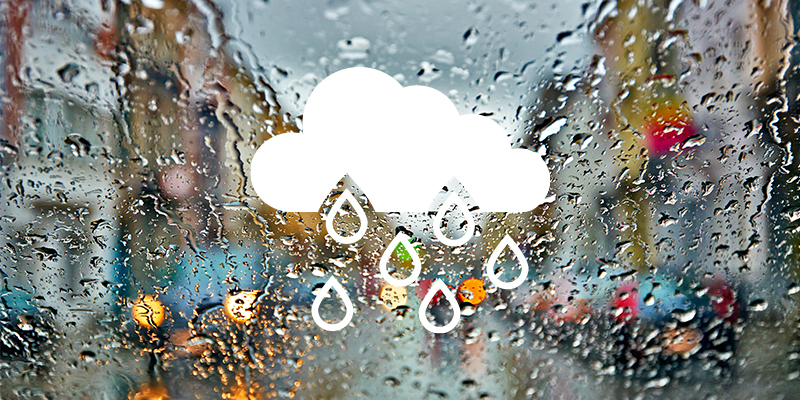
Prevention vs Cure
Innovative technology is at the helm of risk preventative strategies.
One way of reducing risk and claims volumes is through the use of sensor-equipped smart devices for home security, water meters, geysers, lighting protection, and fire prevention.
These smart devices have provided a surge of data sources, which have insurers adopting business strategies such as predictive maintenance, and behavior incentivisation to encourage risk-reducing behaviors, careful driving, and healthy habits.
Tips for the rainy season:
Why your gutters and downspouts are important
Correctly installed gutters and downspouts direct water away from your home. They can help prevent water damage, keep lower areas of your house from flooding, and more. Guiding water away from your home is the most important function a gutter system serves.
Improve the lifespan of your roof
If gutters are clogged or incorrectly installed, they can be flooded by rainwater and the overflow will not only seep under your roof’s covering and inside walls but into the soffit and fascia, which will subsequently cause dampness in your roof cavity space. Over time, mold may develop, causing further damage to both the exterior and interior of your home.
By ensuring your gutters and downspouts are in perfect working order and free of debris, you are proactively protecting your roof and extending its lifespan.
Protect your home’s foundation
Water from your roof flows from your gutters into the downspouts, which must then direct it away from your home. Effective flows away from your house will protect your home’s foundation from water damage.
Clogs in or poor installation of gutters can cause water to collect at the bottom of the downspout, which is in close proximity to the house. This can eventually lead to soil erosion and cracks forming in your home’s foundation.
To avoid any water damage to the foundation of your house, ensure that water flows directly into the gutters and downspouts, which then navigate it away from your house.
Clean your gutters frequently
To enhance the lifespan of gutters and achieve an immaculate home exterior, consistent maintenance is required. The rule of thumb for gutter maintenance is to inspect and clean them at least twice a year, specifically during the autumn and spring months. However, there are instances where you might need to perform maintenance more frequently.
Policyholders residing in rainy areas should perform maintenance more regularly since a gutter’s tendency to clog in such conditions is higher.
Importance of lightning protection
Lightning is one of nature’s most powerful and destructive occurrences. The effects of a direct strike are immediately apparent. The secondary effects of lightning can cause catastrophic damage to electronic systems inside a building. To avoid or minimise these strikes, it’s advised to install adequate lightning, earthing, and surge protection.
This bolt of energy is erratic with regards to where it hits, with strikes occurring both directly beneath the cloud that generated it, or sometimes kilometers away. To prevent lightning from hitting your home is not always possible, but protecting your house is.
Protect your home’s exterior
If correctly installed, lightning rods help direct lightning safely away from your home. Ensure lightning rods are firmly attached to the roof and embedded in the ground by a cable. An alternative option is to invest in a lightning system installed by a professional company. This mechanism takes your entire house, surrounding structures, and landscaping into consideration when grounding for lightning strikes, especially if you are in a high lightning area.
Protect your home’s interior
Lightning can damage electronic devices, electric fences, and other systems in your house that are connected to an electrical outlet. The easiest way to protect your appliances is to unplug them when you first hear the rumble of thunder. Failing this, surge power protectors can assist, but are not fail-proof, against a considerable strike. To protect family members, stay away from materials and pipes that make for excellent conductors.
Driving in the rain
Driving in rain, whether it is light or a heavy downpour, can be one of the most challenging driving situations a driver encounters. Rainy conditions are directly related to higher accident rates. Irrespective of where you live, at some point in your life, you will be required to drive your vehicle in the rain. Knowing how wet roads and reduced visibility impact the way your vehicle handles, will not only keep you and your loved ones but many others, safe on the road.
Inspect your headlights, taillights, and windshield wipers to make sure that they are operational. During thunderstorms, avoid driving over low-lying bridges that can be easily flooded, and pothole-riddled roads. Rather plan alternative and safer routes or postpone your trip entirely.
Remember to check the air pressure and tread of your vehicle’s tires. Balding tires can severely reduce traction on wet roads.
Maintaining your windscreen wipers
Windscreen wiper blades perish due to UV rays, dust, abrasives, acid rain, saltwater, and the remains of insects left on your windscreen. This causes them to lose flexibility and develop curvature, which prevents full contact with your windshield.
Regular maintenance checks are imperative to ensure the proficiency and reliability of your windscreen wiper blades. Always include the rear window blades, the windshield washer pump, hoses, and fluid in your inspection. Replace windscreen wipers every six months or when wipers become hard or old.
“An ounce of prevention is worth a pound of cure”- Benjamin Franklin


